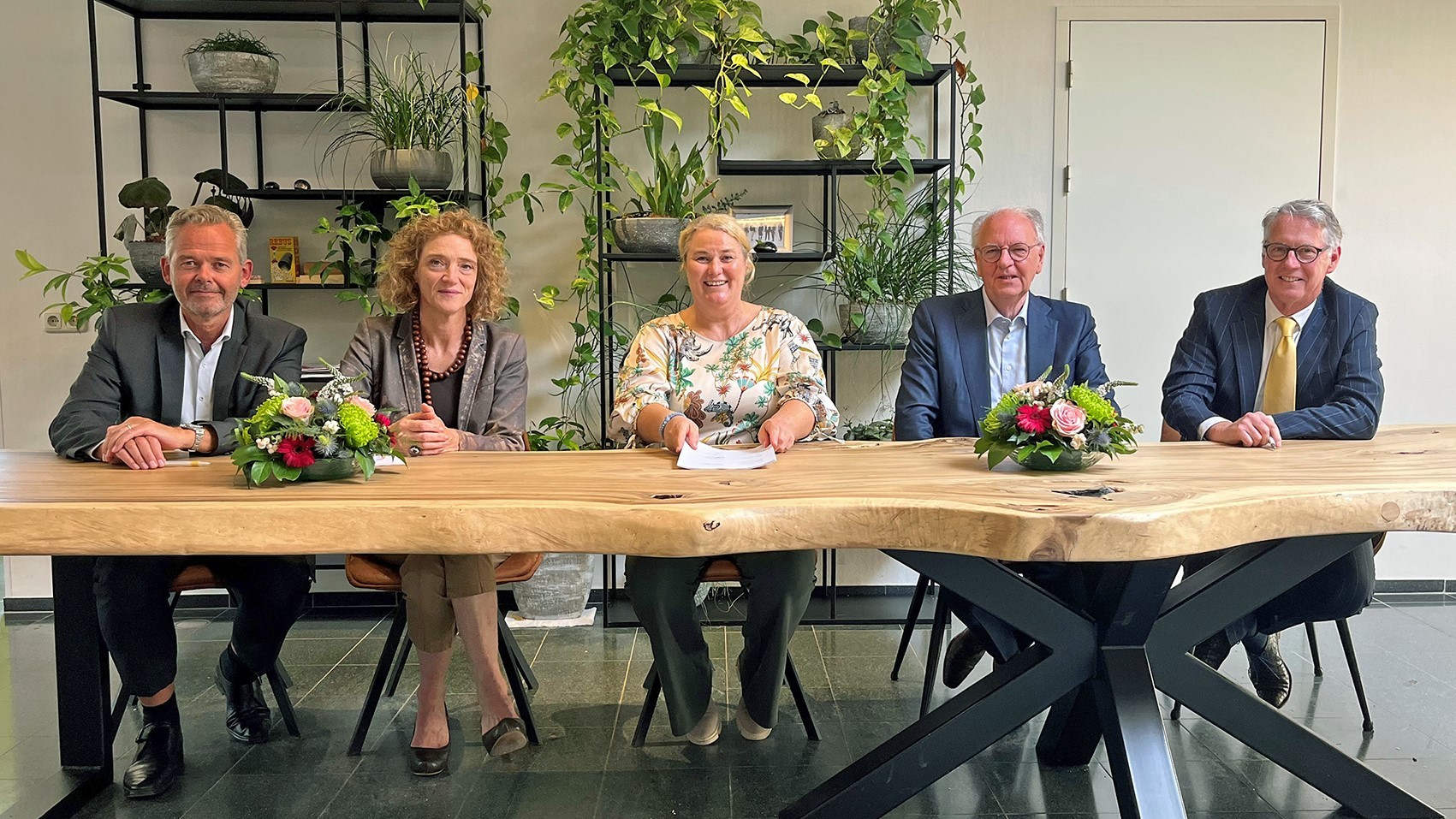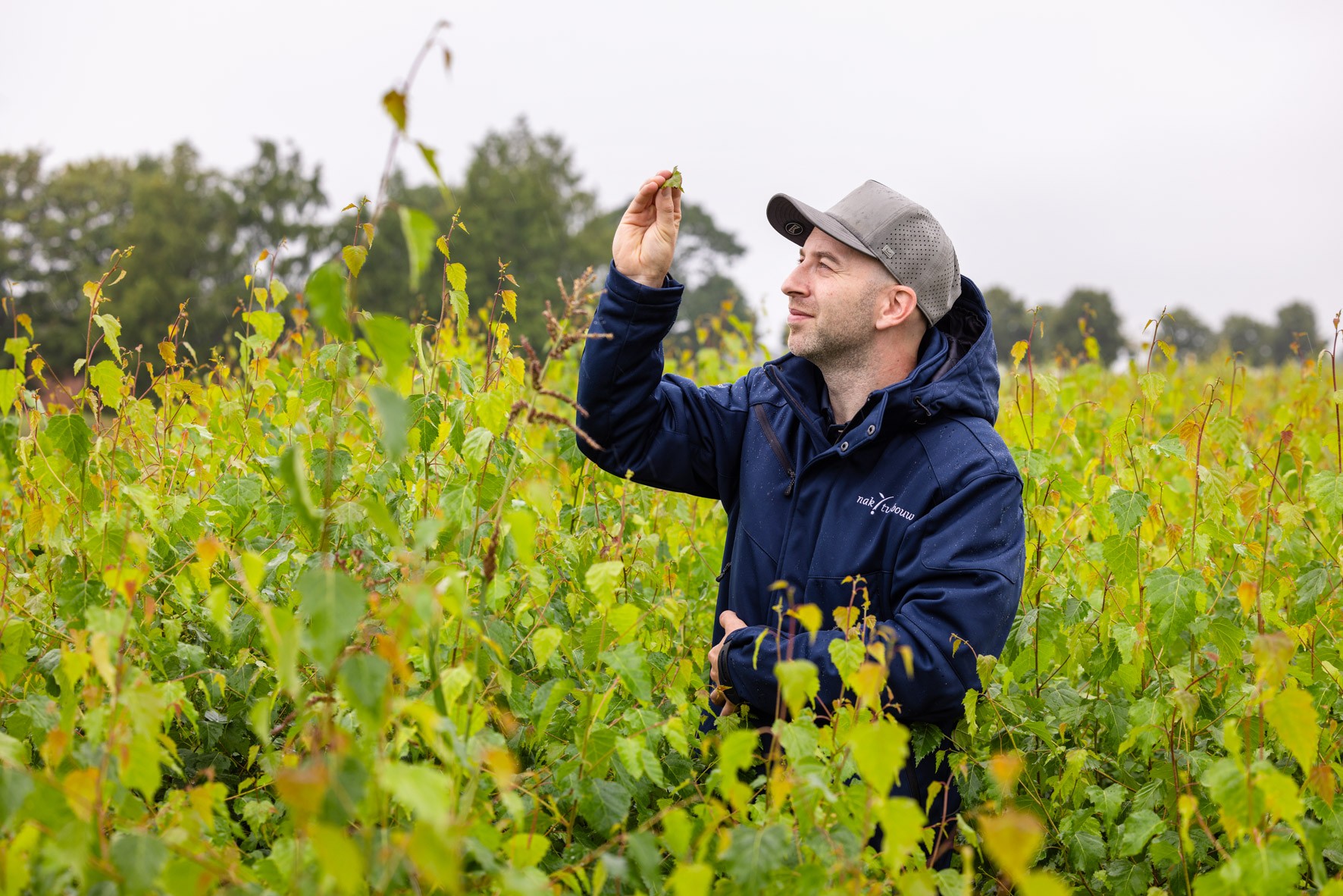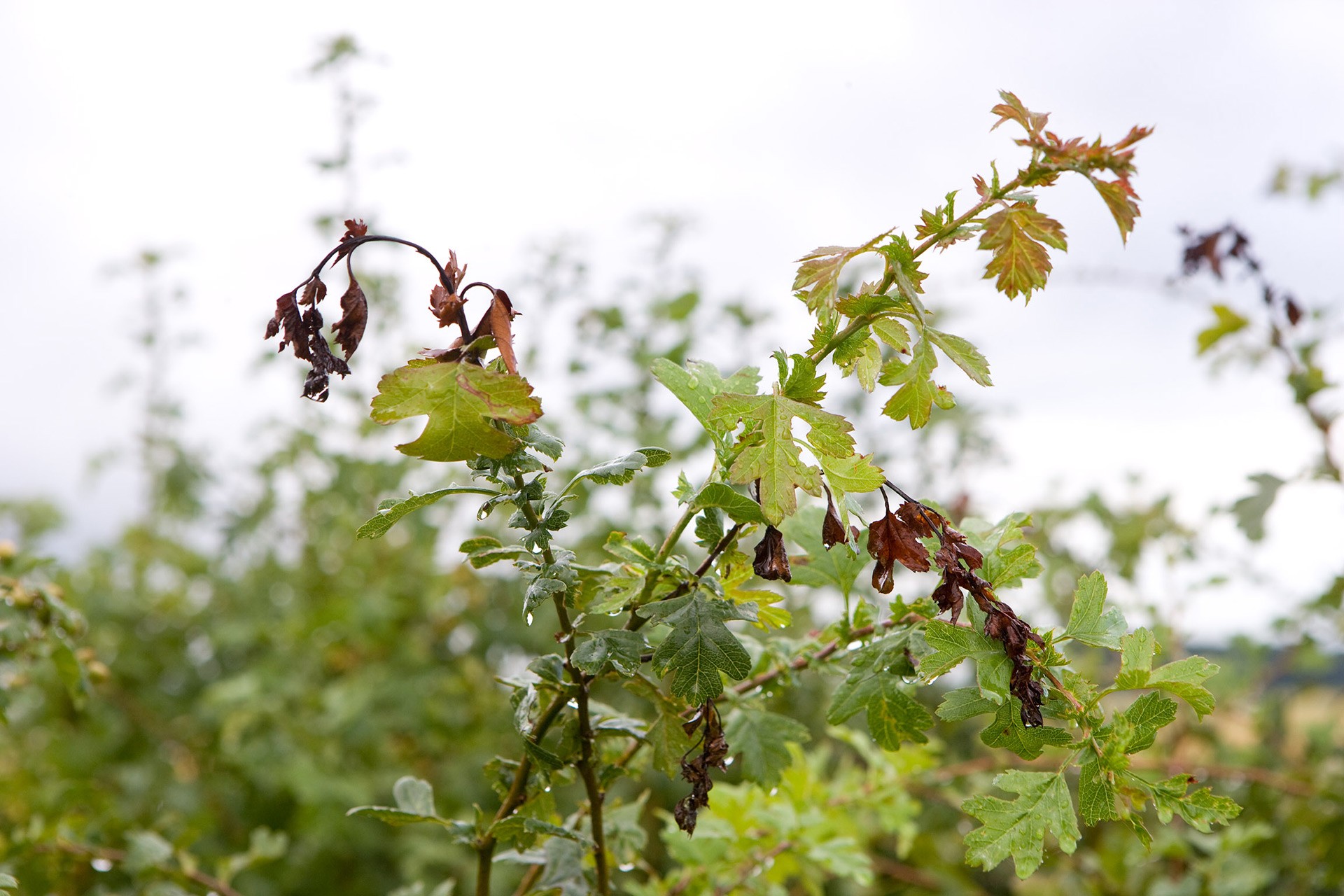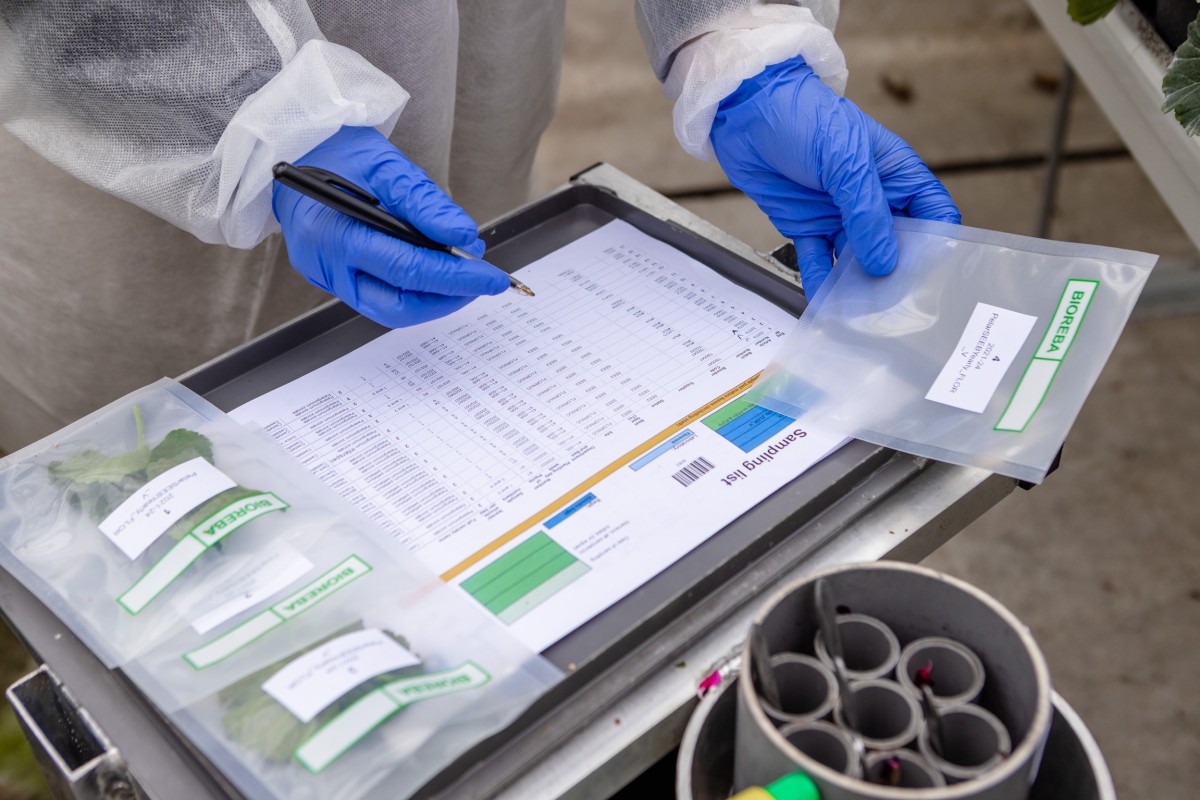
Inspection authorities establish agreements on plant health
On 29 September 2023, the Ministry of LNV and the four plant inspection authorities BKD, KCB, NAK and Naktuinbouw signed the Multi-year Agreement on the application of the Plant Health Law. The MYA contains agreements on the supervision of plant health.
Read more about this in the featured article ‘Inspection authorities establish agreements on plant health’.
Cooperation to raise awareness of quarantine organisms
Together with other professional organisations, Naktuinbouw actively engages in raising risk awareness of quarantine organisms in the arboriculture sector. In June 2023, Treeport Zundert organised a meeting where board members and growers represented regional and national trade organisations. Mayors and councillors from various municipalities with tree nurseries also attended, in addition to the NVWA and Naktuinbouw.
The following organisations are collaborating in the national project 'Awareness and prevention of Q-organisms in the arboriculture sector', headed by Wageningen University & Research: Treeport Zundert, Tree Centre Opheusden, Greenport Boskoop, Boomteeltstudieclub Horst aan de Maas, the Royal Trade Association for Nursery Stock and Flower Bulbs (Anthos), the Netherlands Agricultural and Horticultural Association (LTO) group for Trees, Perennials and Summer Flowers and Naktuinbouw.

Additional inspections commissioned by the NVWA
The NVWA is tasked with responsibility for monitoring quarantine organisms (Q). The four inspection services in the Netherlands have been mandated by the NVWA to perform the actual inspections and testing. If quarantine organisms are detected, the NVWA is responsible for taking further action. Naktuinbouw provides support where possible.
We also monitor the phytosanitary status in the Netherlands on behalf of the NVWA. We examine a number of specific crops for the presence of quarantine organisms, or potential organisms worthy of classification as QO. In 2023, no quarantine organisms were found during these additional inspections.
We also perform an annual inspection of companies that import crops with a high risk of quarantine organisms on behalf of the NVWA. This inspection is important as some pests and diseases only become visible a few weeks after the material has been imported. In 2023, during this inspection, the tropical nematode Meloidogyne enterolobii was detected several times in Ficus microcarpa and Zelkova plants. Read more about this topic below.
Silverleaf whitefly (Bemisia tabaci)
In the first six months of 2023, the United Kingdom detected the silverleaf whitefly (Bemisia tabaci) much more frequently on Mandevilla (Dipladenia) imported from the Netherlands. As a result the NVWA, in consultation with the inspection authorities, decided to intensify inspections of Mandevilla species from 11 July 2023. A higher sample size applies during export inspections and high risk crops must always be included in the sample. Due to the many infected consignments found at import, the phytosanitary service of the United Kingdom visited the Netherlands for an audit. Naktuinbouw received the delegation with the NVWA and demonstrated how inspections are performed.
Root-knot nematode Meloidogyne enterolobii
Meloidogyne enterolobii, a tropical rot knot nematode, has had quarantine status in the EU since 11 April 2022. Naktuinbouw specifically inspects and samples products with a high risk of quarantine organisms imported from certain countries. In 2023 this resulted in ten lots being refused entry due to infection by this nematode. This is a significant improvement compared with 2022, when 30 lots were refused entry. Naktuinbouw inspectors also found this organism twice during export inspections. In this case, the NVWA also imposed additional measures on the supplier of the plants.
The Netherlands Food and Consumer Product Safety Authority (NVWA) imposed strict measures in February following the discovery of Meloidogyne enterolobii during phytosanitary monitoring, specifically targeting Ficus microcarpa which is considered to have the highest risk. Naktuinbouw also took the initiative to apply additional temporary control measures when monitoring the issue of plant passports for the other host plants of this nematode. Supervision was temporarily intensified. The ability of companies to recognise the nematode was checked and how they performed their own company inspections.
Additional visits were paid to companies that grow one or more of the following crops: Amaranthus, Caladium, Callistemon, Chlorophytum, Colocasia, Ficus (other), Fraxinus (pot plant), Gardenia, Hibiscus (pot plant), Ligustrum (pot plant), Philodendron, Portulacaria, Sageretia, Syngonium, Xanthosoma and Zelkova (pot plant).

Fire blight
For the Raad voor de Boomkwekerij foundation for nursery stock, we performed inspection activities in fire blight-free zones in the Netherlands, both in public green spaces and at nurseries. In 2023, there were considerably fewer finds: from the 254 fire blight infections in 2022 to 162 infections in 2023.
Various fire blight-free zones were changed in the summer of 2023. The borders of the fire blight-free zones were adapted in Lichtenvoorde (6), Udenhout- St Oedenrode (8), Bergeijk (9) and Boxmeer-Venray-Tegelen-Nederweert (10). On request of the arboriculture sector, the zones have been extended or reduced.
Accreditation systems
Naktuinbouw has developed various company accreditation systems that demonstrate the added value or superior quality of products. A few companies withdrew from participation in an accreditation system in 2023, while other companies decided to re-register.

Elite Ornamental Crops
Naktuinbouw Elite Ornamental Crops is an accreditation system for the ornamental crops sector. There are now 21 participants worldwide who produce propagating material and perennials that are disease-free and true to variety.
Elite Pome Fruit
Naktuinbouw Elite Pome Fruit is additional to EU certification of pome fruit crops. The conditions of Naktuinbouw Elite Pome Fruit place higher standards on companies and their trees or rootstock. If all the requirements are met, the propagating material may be traded with a certificate and an Elite label. There are 32 companies authorised to use the Elite Pome Fruit label.
Elite Soft Fruit
In cooperation with the soft fruit sector, Naktuinbouw has developed an accreditation system that enables growers to demonstrate the added value and superior quality of their products. Naktuinbouw Elite Soft Fruit is additional to EU certification of fruit crops. There are eight growers authorised to use the Elite Soft Fruit label.
NAL
NAL stands for Naktuinbouw Authorised Laboratories. NAL enables participants to make the right decisions based on reliable data obtained from laboratory testing in their own laboratories. The certificates allow participants to demonstrate the health and quality of material destined for international trading. At present, there are 20 participants worldwide. Taken together, the companies with NAL authorisation represent more than 80% of the market share in the international trade of vegetable seeds.
Select Plant
Naktuinbouw Select Plant is a system for lots of propagating material of extra quality. Naktuinbouw performs additional inspections, sampling and tests to demonstrate that asparagus, alstroemeria, freesia and hosta are disease-free.
Naktuinbouw Select Plant Avenue and Ornamental trees safeguards the certainty of the identity and origin of avenue and ornamental trees.
Among other things, Naktuinbouw Select Plant Plants ensures that the accredited companies produce propagating material on PCN-free plots of land.
BOOT
The BOOT accreditation system was introduced in 2022 for sampling of tomato and sweet pepper seeds for ToBRFV testing for official test results, such as issuing plant passports and export certification.
The Dutch acronym BOOT (Bemonstering Onder Officieel Toezicht) stands for sampling under official supervision. Naktuinbouw monitors the testing activities by performing a company audit. The NVWA monitors BOOT using post control and an audit of the system. To date six companies have BOOT accreditation.
NEW: Hygiene System Plant Cultivation (HSPO)
Plantum and Naktuinbouw worked together on a new hygiene system for plant growers: HSPO. This allows them to improve hygiene at the company and possibly reduce Naktuinbouw's inspection intensity.
The advantages of HSPO are that it increases the health and quality of the cultivation material. And that the chance of any problems or damage further down the chain is reduced.
The system will continue to connect to the various other systems that are currently running at the plant nurseries. This without doubling the requirements. This includes Plant Proof, regular Naktuinbouw inspections and recognition for the use of the plant passport. The system is open to all crops and to all pathogens relevant to the crop.
